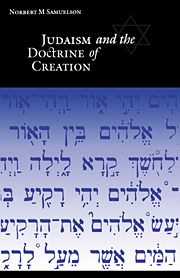PART 4 - A BELIEVABLE VIEW OF CREATION
Published online by Cambridge University Press: 08 January 2010
Summary
To understand the universe is a positive religious obligation, but it is one that can never be perfectly fulfilled. If knowledge means to understand in detail with certainty, then there can be no knowledge. The available sources for judgments are the evidence of sense experience, the written records of what others (past and present) have experienced, rational/logical reflection on that evidence, the words of revealed scriptures, and the written records of how others (past and present) have interpreted these scriptures. None of these sources in themselves are perfectly reliable. Not all experience is veridical; there are illusions and hallucinations. Not all rational reflection is demonstrative; arguments are no better than their premises and reason itself cannot provide true premises; furthermore, there is more than one kind of logic, and it is not always clear what kind is appropriate to any particular kind of question. Clearly there is no way to prove that any particular scripture in any religious tradition really is revelation, and if it is not, its value as a basis for truth judgments is questionable. Finally, even if we grant that a particular text does in fact record divine revelation, there is no way to be certain that our, or anyone else's, interpretation of the text is what its purported divine author intended to communicate. Furthermore, there is always new sense experience, some of which is novel, and we often discover new ways of thinking that change the way we understand both our past experience and our revealed texts. This novelty often has in the past, and certainly can in the future, change what we think we believe to be true about almost anything.
- Type
- Chapter
- Information
- Judaism and the Doctrine of Creation , pp. 199 - 205Publisher: Cambridge University PressPrint publication year: 1994



